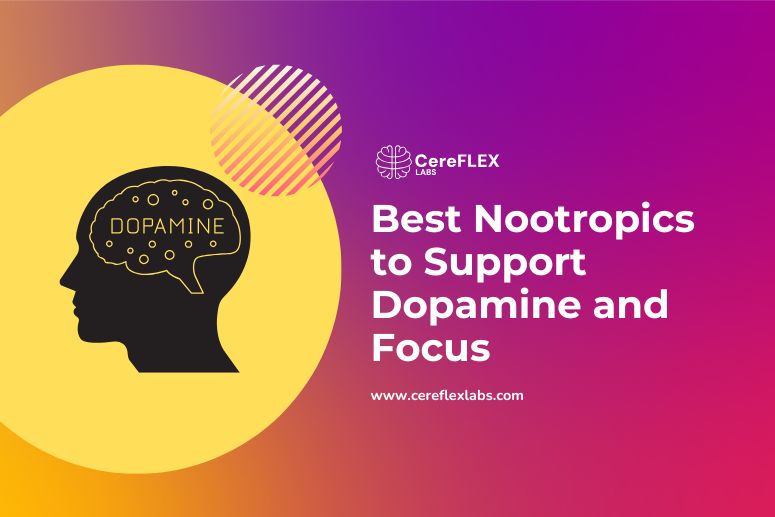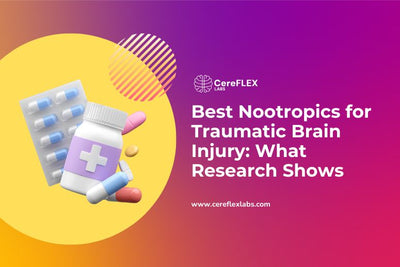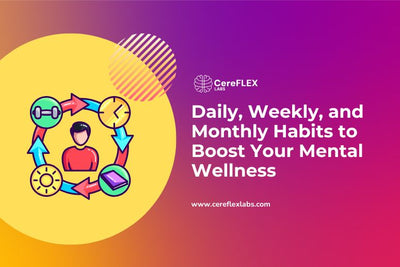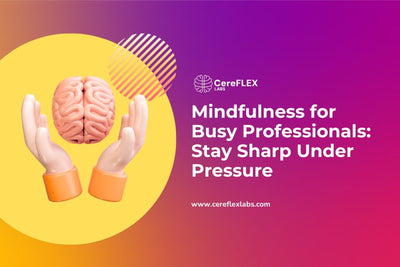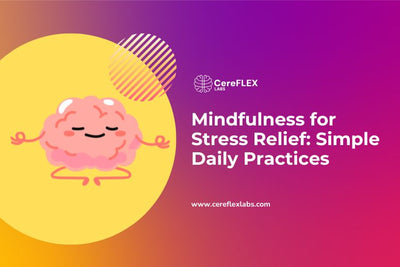Feeling foggy, unmotivated, or mentally sluggish? You’re not alone—and low dopamine may be partly to blame.
Often called the brain’s “motivation molecule,” dopamine plays a vital role in memory, focus, drive, and mental clarity. When dopamine dips, even simple tasks can feel exhausting. You might find it harder to concentrate, feel energized, or enjoy the things that usually bring you joy.
That’s where dopamine-supportive nootropics come in.
Nootropics, also known as “smart drugs” or cognitive enhancers, are compounds used to support mental performance. Some of the most effective options may help balance dopamine levels by encouraging its natural production, enhancing receptor sensitivity, or protecting dopamine pathways from stress.
In this guide, we’ll explore the top nootropics that may support healthy dopamine function and help promote focus, motivation, and mental clarity—without relying on stimulants or risky shortcuts.
Here is the Quick Answer |
|
Dopamine is central to mental clarity, motivation, and focus. Low levels can lead to fatigue, brain fog, and decreased drive. Nootropics like L‑Tyrosine, Mucuna Pruriens, Rhodiola Rosea, and Phenylalanine may help support dopamine pathways and cognitive function. Look for supplements that use clinically backed ingredients, transparent labeling, and third-party testing. For daily support, Cereflex Labs’ AM/PM Protocol offers a well-rounded, science-based approach to cognitive wellness from morning to night. |

What is dopamine and why does it matter for mental clarity?
Dopamine is one of the brain’s most influential chemical messengers. It functions as both a neurotransmitter and hormone, helping your nervous system relay signals between brain cells and throughout the body.
While dopamine influences everything from mood to motor control, it’s especially important for focus, motivation, and cognitive performance.
When your dopamine system is functioning well, your mind feels clear and energized. You can stay on task, push through challenges, and feel a sense of accomplishment after reaching your goals.
How Dopamine Affects the Brain
Dopamine travels through four major pathways in the brain. Along the way, it interacts with different receptors, influencing how you think, feel, and move.
Dopamine is involved in:
- Focus and attention
- Memory and learning
- Mood and reward
- Motivation and drive
- Movement and coordination
Even small rewards (completing a to-do list, enjoying a good meal, hearing praise) can trigger dopamine release. It’s your brain’s way of reinforcing behaviours that lead to positive outcomes.
The Importance of Balance
Too little dopamine can leave you feeling foggy, flat, or unmotivated. Too much can lead to restlessness or even impulsivity.
Some examples:
- Low dopamine has been linked to mood disorders, fatigue, and difficulty focusing.
- Excess dopamine, especially in certain brain regions, may contribute to insomnia or agitation.
Supporting dopamine isn’t about pushing it to the max. It’s about maintaining healthy balance, which is where nootropics may be useful when chosen thoughtfully.
Signs of Low Dopamine
When dopamine production is low, or when your brain can’t use it efficiently, you may notice:
- Trouble concentrating or staying organized
- Low motivation or “blah” feelings
- Difficulty enjoying things you used to love
- Feelings of fatigue or emotional flatness
- Increased procrastination or restlessness
- Sleep disturbances or low drive
If these sound familiar, your dopamine system may need support. Certain nootropics are used to help modulate dopamine naturally, especially when paired with quality sleep, nutrition, and stress management.
What causes dopamine deficiency?
Dopamine deficiency occurs when the brain doesn’t produce enough dopamine or struggles to use it effectively. This can disrupt everything from motivation and focus to sleep, movement, and emotional balance.
The causes can range from neurological conditions and lifestyle factors to chronic stress or even genetics. Understanding the root can help determine whether dopamine-supporting nootropics might help.

1. Parkinson’s Disease
Parkinson’s disease damages the brain’s dopamine-producing neurons. As these cells deteriorate, motor symptoms such as tremors, rigidity, and slowed movement become more pronounced. Dopamine loss is central to the disease’s progression.
2. ADHD (Attention Deficit Hyperactivity Disorder)
Dopamine dysregulation plays a role in ADHD. Low dopamine activity may affect focus, impulse control, and attention span. This is why some ADHD medications work by boosting dopamine levels to enhance mental control.
For more insights, check out our blog on best nootropics for ADHD.
3. Substance Use Disorder
Substances like cocaine or methamphetamine trigger intense dopamine surges. Over time, repeated use can damage dopamine receptors, leading to lower baseline dopamine, emotional crashes, and reduced motivation during withdrawal.
4. Depression

Anhedonia (losing pleasure in things you used to enjoy) is a hallmark of major depression, often linked to disrupted dopamine signalling. Mood, motivation, and energy are all affected when dopamine levels drop.
5. Obesity
Chronic inflammation and insulin resistance associated with obesity can impair dopamine production and function. This may alter how the brain responds to rewards, especially around food and cravings.
6. Lack of Sleep
Sleep is crucial for maintaining dopamine balance. Inadequate or poor-quality sleep reduces dopamine receptor sensitivity, contributing to fatigue, brain fog, and slower mental processing.
7. Chronic Stress

Prolonged stress increases cortisol, which interferes with dopamine synthesis and receptor function. Over time, stress can exhaust dopamine reserves, resulting in low drive, low mood, and reduced cognitive performance.
8. Genetic Predisposition
Your dopamine baseline may be partially inherited. Some people naturally produce or use dopamine less efficiently due to genetic factors, making them more vulnerable to symptoms like mental fatigue or lack of motivation.
9. Brain Injuries
Traumatic brain injuries (TBI) can damage the areas responsible for dopamine signalling. In some cases, this disruption may contribute to cognitive impairment, mood instability, or reduced motivation.
What nootropics increase dopamine?
Looking to sharpen focus, lift mental fog, or regain your motivation? Certain nootropics may help support your brain’s dopamine system, either by increasing production, slowing breakdown, or improving signalling. Below are some of the most studied natural compounds that may support dopamine activity.
Each of these nootropics is backed by emerging research and is generally well-tolerated when used as part of a responsible routine.
L‑Tyrosine

L-Tyrosine is a naturally occurring amino acid and a direct precursor to dopamine. Your body uses it to make L-Dopa, which is then converted into dopamine.
A large-scale study found that higher dietary tyrosine intake was positively linked to working memory, episodic memory, and fluid intelligence in both younger and older adults.1
Foods rich in tyrosine include eggs, dairy, soy, and fish, but supplements offer more concentrated, targeted support for mental performance under stress.
Mucuna Pruriens (L‑Dopa)

Mucuna Pruriens is a tropical legume containing high levels of L-Dopa, the immediate precursor to dopamine. It’s often used in traditional medicine and has shown mood-enhancing properties in preclinical models.
In one study, mice treated with Mucuna seed extract showed reduced depressive behaviour through a dopamine-mediated mechanism. The effects disappeared when dopamine blockers were introduced, further confirming its dopaminergic action.2
Rhodiola Rosea

Rhodiola rosea is an adaptogenic herb known for its cognitive and stress resilience benefits. Extracts like SHR-5 may help raise dopamine levels by making the blood-brain barrier more permeable to dopamine precursors and slowing their breakdown via MAO inhibition.
Some research also suggests Rhodiola may promote the survival of dopamine-producing neurons, supporting long-term brain health and emotional regulation.3
Phenylalanine

Phenylalanine is an essential amino acid and the first step in the biosynthesis of dopamine. Without enough of it, dopamine production may drop, leading to slow cognition and lower reaction speed.
Research has linked phenylalanine deficiency with impaired brain performance and EEG abnormalities.4 While more studies are needed, phenylalanine remains foundational in dopamine metabolism.
(OMEGA-3) Fatty Acids

Omega-3s (especially DHA and EPA) are vital for brain health and dopamine receptor function. Deficiencies in omega-3s may worsen neurological conditions tied to dopamine disruption, including ADHD and depression.
One review noted that omega-3 status directly affects dopamine signalling and brain plasticity, making it a valuable long-term support nutrient.5
Citicoline

Citicoline (CDP-Choline) supports dopamine in two ways: by increasing dopamine synthesis and improving receptor function. It has shown promise in clinical trials for addiction, cognitive decline, and even appetite regulation.
In one study, participants taking 2,000 mg of citicoline showed enhanced brain activity in dopamine-rich areas and experienced reduced food cravings, suggesting a dopaminergic effect.6
Bacopa Monnieri

Bacopa monnieri is an Ayurvedic herb traditionally used for memory and stress support. Its dopaminergic effects aren’t as direct as L-Tyrosine or Mucuna, but it has been shown to modulate multiple neurotransmitters, including dopamine, in both animal and human studies.
It also supports brain health through antioxidant protection and cerebral blood flow enhancement, making it a well-rounded choice for cognitive wellness.7
How to Choose the Right Supplement
Not all dopamine-boosting nootropics are created equal. The right supplement can help improve mental clarity, focus, and mood, but only if it’s formulated with quality, transparency, and safety in mind.
Here’s what to look for when evaluating your options:
Clinical Dosages
Make sure the product contains ingredients at doses shown to be effective in peer-reviewed human studies. Underdosing is common and may result in minimal or no cognitive benefit.
Transparent Labeling
Avoid supplements that hide ingredient amounts behind “proprietary blends.” Transparency allows you to evaluate the formula, compare it to existing research, and make informed decisions.
Third-Party Testing
Reputable brands verify their products through independent laboratory testing. This ensures that what’s on the label is in the bottle, and that it’s free from contaminants, heavy metals, or harmful additives.
Synthetic vs. Natural Nootropics
Understanding the source of your nootropics is essential:
Natural nootropics (e.g., Rhodiola, Mucuna, Bacopa) often provide a gentler effect, with added adaptogenic or antioxidant benefits.
Synthetic nootropics may offer higher potency or targeted mechanisms, but they also require more careful dosing and cycling.
Your personal tolerance, goals, and health status should guide your choice between these options.
Conclusion
Dopamine is central to how we think, focus, and stay motivated. When levels drop, even simple tasks can feel overwhelming. Fortunately, certain nootropics may help support this vital system, without relying on harsh stimulants or synthetic shortcuts.
Compounds like L‑Tyrosine, Rhodiola Rosea, Phenylalanine, and Mucuna Pruriens offer distinct pathways for promoting dopamine balance and restoring cognitive clarity. But effectiveness depends on choosing well-formulated products made with purpose and precision.
Cereflex Labs’ AM/PM Protocol is designed to provide that structure.
It offers comprehensive, science-informed support through two targeted formulas:
- Brain Morning Formula (AM): Focuses on supporting memory, circulation, and daily energy with clinically researched ingredients and a vitamin-mineral foundation.
- Cognitive Support Evening Formula (PM): Helps the brain transition into recovery mode, supporting mood regulation and long-term resilience through antioxidant and adaptogenic support.
Each formula reflects our commitment to transparency, ingredient integrity, and daily cognitive wellness—without the guesswork of DIY stacks or unregulated imports.
Explore a balanced, structured approach to brain health with the Cereflex AM/PM Protocol.
